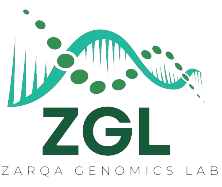
Welcome to Zarqa Genomics Lab (ZGL), your trusted ally in unraveling the mysteries encoded within your patients’ DNA. As a premier genomics laboratory, we specialize in the sequencing and interpretation of genomic data to provide unprecedented medical insights.

At ZGL, our primary focus is on conducting comprehensive whole exome and whole genome tests, delivering intricate details about genetic variants that exert influence over your patients’ health. Through the application of cutting-edge technology and expert analysis, we shed light on the complex pathways of genetic makeup, equipping you with the knowledge needed to make informed decisions for your patients’ well-being.
Stands as an advanced genetic analysis technique gaining recognition as the preferred first-line genetic test in routine clinical settings. It transcends the limitations of targeted tests by encompassing coding and non-coding regions, along with mitochondrial DNA (mtDNA), thus offering a holistic view of your patients’ genetic landscape and optimizing diagnostic value.
Presents a comprehensive approach, meticulously sequencing the exons of all protein-coding genes alongside thousands of known disease-causing variants and the mitochondrial genome. With WES, potential disease-causing variants overlooked by previous tests can be identified. Despite representing only 1-2% of the human genome, the exome harbors approximately 85% of known disease-related variants.

NGS scrutinizes genes such as MYH7, MYBPC3, and TNNT2, shedding light on genetic variations associated with HCM
Genes including KCNQ1, KCNH2, and SCN5A undergo comprehensive analysis, offering insights into LQTS-related mutations.
NGS explores genetic markers within desmosomal genes like PKP2, DSP, and DSG2, unraveling the genetic underpinnings of ARVC.
Genetic investigations focus on genes like NKX2-5, GATA4, and TBX5, contributing to a deeper understanding of congenital heart defects
SCN5A mutations and other genetic variants are examined through NGS, offering insights into the predisposition to Brugada Syndrome
NGS delves into genes such as LMNA, TNNT2, and MYH7, providing a molecular understanding of DCM pathology
RYR2 and CASQ2 genes are scrutinized, revealing genetic variations associated with CPVT susceptibility
Genetic analysis targets genes like KCNH2 and KCNQ1, unraveling the genetic fabric underlying SQTS manifestations
CACNA1C gene mutations are explored through NGS, offering insights into the genetic basis of Timothy Syndrome
Comprehensive genetic investigations encompass genes such as SCN5A, KCNQ1, and KCNH2, elucidating various hereditary arrhythmia syndromes
Genetic analysis of genes like ENG and ACVRL1 provides a molecular understanding of HHT
NGS explores genes like ZIC3 and NODAL, contributing to a deeper understanding of heterotaxy syndrome
Genetic scrutiny of APOC2, LPL, and APOA5 genes reveals insights into the genetic basis of hypertriglyceridemia
Genetic investigations focus on genes such as COL4A1, COL4A2, and COL3A1, contributing to a deeper understanding of dolichoectasia
NGS explores genes associated with magnesium homeostasis, shedding light on the genetic factors contributing to hypomagnesemia
Sample types: saliva, blood, DBS cards, isolated DNA
TAT: All samples are processed within 45 working days
Zarqa Genomics is committed to empowering healthcare professionals like you with invaluable genetic insights to enhance patient care and improve health outcomes. Partner with us on the journey to personalized medicine and transformative healthcare solutions.
Discover our advanced genomic testing services tailored for your specific needs. Contact us today to enhance your research with unparalleled accuracy and expertise.
Get The Latest Updates via email. Any time you may unsubscribe
Copyright © 2024 Zarqa Genomics Lab, All rights reserved